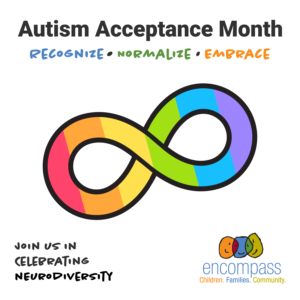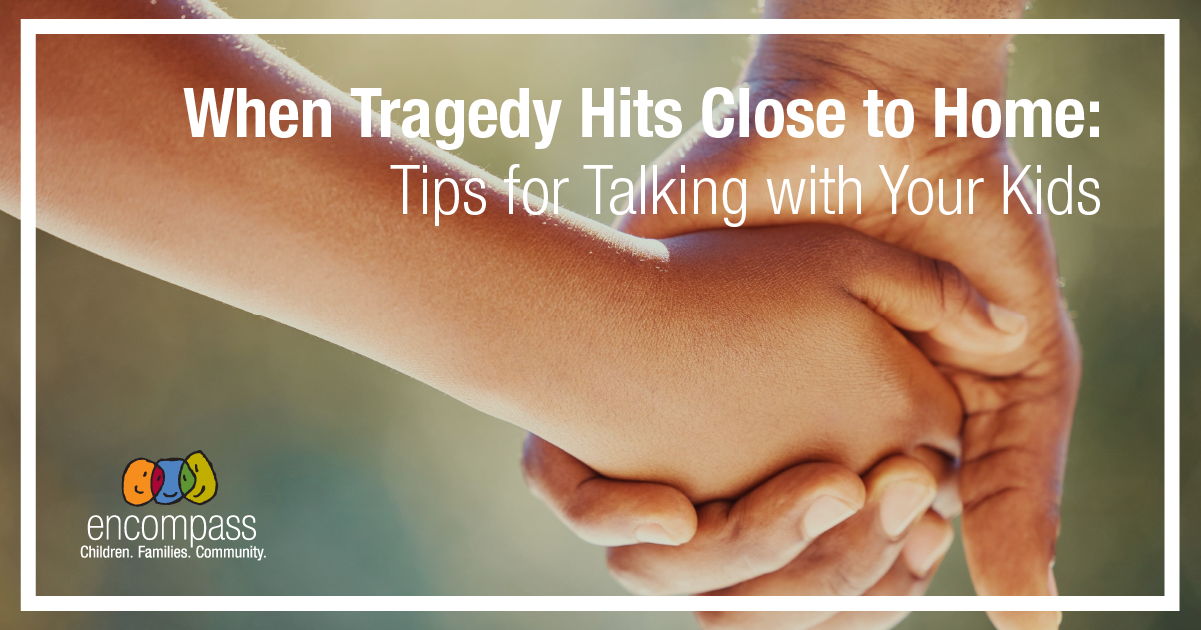Neurodiversity: All Brains are Beautiful
At Encompass we value diversity. We see the benefits of working with diverse families and employing a diverse staff. We even work to ensure biodiversity in our sensory garden. Recently, we have been exploring a new type of diversity — neurodiversity.
 According to Autistic Self-Advocate Dr. Nick Walker, “Neurodiversity is the diversity of human minds, the infinite variation in neurocognitive functioning within our species.” This alone is not necessarily a new idea; however, the neurodiversity paradigm is. Dr. Walker goes on to define the neurodiversity paradigm as, “a specific perspective on neurodiversity”. In short, this new perspective simply views neurodiversity as another type of diversity, one that also brings value to families and communities.
According to Autistic Self-Advocate Dr. Nick Walker, “Neurodiversity is the diversity of human minds, the infinite variation in neurocognitive functioning within our species.” This alone is not necessarily a new idea; however, the neurodiversity paradigm is. Dr. Walker goes on to define the neurodiversity paradigm as, “a specific perspective on neurodiversity”. In short, this new perspective simply views neurodiversity as another type of diversity, one that also brings value to families and communities.
In learning about other cultures, ethnicities, sexual orientations, or gender expressions, seeking out a perspective from someone who is genuinely a part of that community is second nature. But that is not always the case when it comes to Autism. For example, anyone who works in healthcare will tell you that using “person-first language” (e.g. “person with Autism”) was heavily emphasized in college programs. However, in reading articles and posts from Actually Autistic (AA) people, the opposite preference seems to be true. Rather than referring to someone as ‘a person with Autism’, Lydia Brown, an Autistic intern at the Autistic Self-Advocacy Network (ASAN), writes about a distinct difference in word choice.
“In the autism community, many self-advocates and their allies prefer terminology such as ‘Autistic’, ‘Autistic person’, or ‘Autistic individual’ because we understand autism as an inherent part of an individual’s identity,” says Brown.
So when it comes to support for neurodivergent people, why is the research largely driven by neurotypical people? How do we work to make sure neurodivergent people have a seat at the table when it comes to their own support systems? It starts with listening to neurodivergent voices and honoring their perspective.
If you’re just starting this learning process, Encompass is here to help! Here is a list of vocabulary words that you may encounter when seeking out neurodivergent people’s perspectives.
- Neurodivergent (ND): People whose minds think, learn, and experience the world in a different, yet equally valid way. This includes autism, ADHD, epilepsy, mental illness, and others.
- Neurotypical (NT): People whose minds think, learn, and experience the world in a way similar to most others. This may include Autistic people, ADHDers, people with a mental health disorder, or people with epilepsy.
- Actually Autistic (AA): An abbreviation often used online to indicate that the writer is actually autistic.
- Identity-first language: Most Autistic people prefer identify-first language (e.g. Autistic person) rather than person-first language (e.g. person with Autism)
- However, everyone has their individual preferences. When in doubt, always ask!
- Highly Sensitive Person: This term typically refers to sensory sensitivity. Highly Sensitive People may be more impacted by environmental factors such as noise, odor, textures, and even taste.
- Body double: ADHDers benefit from having another person in the room with them so that they can complete tasks. That person doesn’t need to directly help them with their task; usually, their presence alone helps ADHDers maintain attention.
- The Double Empathy problem: According to Rachel Zamzow, “The basis of the theory is that a mismatch between two people can lead to faulty communication. This disconnect can occur at many levels, from conversation styles to how people see the world. The greater the disconnect, the more difficulty the two people will have interacting.”
At Encompass, we are actively trying to bring in new treatment approaches that neurodivergent people have identified as beneficial to their overall quality of life. Treatment approaches like DIRFloortime and AutPlay focus on building a foundation of connection and shared joy while supporting self-advocacy and sensory regulation.
It’s time to start including neurodivergent people in the discussion around their own care and supports. If you are a neurodivergent person and have thoughts about how we can better support you or children like you, please reach out to our team. We would love to collaborate!
Sources:
Dr. Nick Walker’s blog: https://neuroqueer.com/neurodiversity-terms-and-definitions/
Lydia Brown via the ASAN website: https://autisticadvocacy.org/about-asan/identity-first-language/
Rachel Zamzow: https://www.spectrumnews.org/news/double-empathy-explained/
DIRFloortime website: https://www.icdl.com/dir
AutPlay therapy website: https://autplaytherapy.com/
* Encompass is aware of the many areas where neurodiversity intersects with race, ethnicity, gender expression, sexual orientation, socioeconomic status, and mental health. While there is no way to account for everyone’s individual life experiences, we acknowledge that some neurodivergent people might have experiences that differ from the ones portrayed in this article.














